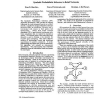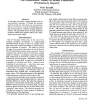AAAI
1990
14 years 21 days ago
1990
Wecombinesimpleretrievalwithdomain-specicvalidationofretrieved casestoproduceausefulpracticaltoolforcase-basedreasoning.Basedon 200real-worldcases,weretrievebetweenthreeandsixcase...
AAAI
1990
14 years 21 days ago
1990
The Symbolic Probabilistic Inference (SPI) Algorithm [D'Ambrosio, 19891 provides an efficient framework for resolving general queries on a belief network. It applies the conc...
AAAI
1990
14 years 21 days ago
1990
In this paper we present a purely semantic view on non-monotonic reasoning. We follow the direction pointed in [16] and claim that any non-monotonic logic can be viewed as a resul...
AAAI
1990
14 years 21 days ago
1990
Programs such as Bacon, Abacus, Coper, Kepler and others are designed to find functional relationships of scientific significance in numerical data without relying on the deep dom...
AAAI
1990
14 years 21 days ago
1990
AAAI
1990
14 years 21 days ago
1990
To design a task-independent dialogue system, we present a task-oriented dialogue analysis in terms of finding the referents of definite descriptions and we show how this analysis...
AAAI
1990
14 years 21 days ago
1990
A case-based reasoner can frequently benefit from using pieces of multiple previous cases in the course of solving a single problem. In our model, case pieces, called snippets, ar...
AAAI
1990
14 years 21 days ago
1990
We describe a system called Tileworld, which consists of a simulated robot agent and a simulated environment which is both dynamic and unpredictable. Both the agent and the enviro...
AAAI
1990
14 years 21 days ago
1990
This work pertains to the Knuth-Bendix (KB) algorithm which tries to find a complete set of reductions from a given set of equations. In the KB algorithm a term ordering is employ...
AAAI
1990
14 years 21 days ago
1990
A central problem in text-understanding research is the indeterminacy of natural language. Two related issues that arise in confronting this problem are the need to make complex i...




